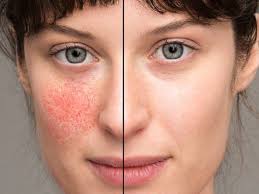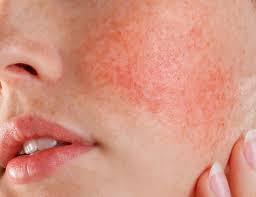
Understanding Rosacea and Treatment Options:
Rosacea is a chronic skin condition characterized by redness, flushing, visible blood vessels, and sometimes pimples and swelling on the face. While the exact cause of rosacea is unknown, factors such as genetics, abnormalities in the blood vessels, and environmental triggers can contribute to its development.
Advanced Rosacea Treatment Options at Belle Clinic: Microsclerotherapy, Laser Therapy, IPL Therapy and Veinwave:
- Laser Therapy:
Laser therapy is an effective treatment option for managing rosacea symptoms. At Belle Clinic, we offer two types of laser treatments: PicoWay and Diod Laser.
- PicoWay Laser: PicoWay is a non-invasive laser treatment that uses ultra-short pulses of energy to target and break down excess blood vessels and pigment in the skin associated with rosacea. By precisely targeting the affected areas, PicoWay can help reduce redness and improve overall skin tone and texture.
- Diod Laser: Diod Laser treatment is another option for managing rosacea symptoms. This laser targets blood vessels and can effectively reduce redness and flushing associated with rosacea. Diod Laser treatment is safe, comfortable, and requires minimal downtime.
2. Veinwave Treatment:
Veinwave treatment is a non-invasive procedure that uses high-frequency technology to target and eliminate dilated blood vessels responsible for the redness and visible veins associated with rosacea. By precisely delivering heat energy to the affected vessels, Veinwave treatment can effectively reduce redness and improve skin tone without damaging surrounding tissue.
3. Microsclerotherapy:
Microsclerotherapy is a minimally invasive procedure commonly used to treat spider veins and small varicose veins. During the procedure, a sclerosing agent is injected directly into the affected blood vessels, causing them to collapse and eventually be absorbed by the body. While traditionally used for leg veins, microsclerotherapy can also be effective for treating facial telangiectasia, or spider veins, associated with rosacea.
4. IPL Therapy:
IPL therapy, also known as photofacial or photorejuvenation, is a non-invasive treatment that uses broad-spectrum light to target various skin concerns, including redness, pigmentation irregularities, and vascular lesions. IPL delivers pulses of light energy to the skin, selectively targeting hemoglobin in the blood vessels and melanin in pigmented areas. This causes the blood vessels to constrict and fade, resulting in a reduction in redness and an overall improvement in skin tone and texture.
Is Rosacea Genetic?
While the exact cause of rosacea is not fully understood, genetics likely play a role in its development. Individuals with a family history of rosacea may have an increased risk of developing the condition themselves. However, environmental factors and triggers also contribute to the onset and exacerbation of rosacea symptoms.
Can Rosacea be Avoided?
While it may not be possible to completely avoid rosacea, there are steps you can take to help reduce your risk and minimize flare-ups:
- Identify and Avoid Triggers: Pay attention to factors that trigger your rosacea symptoms, such as sun exposure, spicy foods, alcohol, extreme temperatures, and stress. Avoiding or minimizing exposure to these triggers can help prevent flare-ups.
- Protect Your Skin: Use a broad-spectrum sunscreen with SPF 30 or higher daily to protect your skin from sun damage, which can worsen rosacea symptoms. Additionally, wear protective clothing, such as hats and sunglasses, when outdoors.
- Gentle Skincare: Choose skincare products that are gentle and suitable for sensitive skin. Avoid harsh cleansers, exfoliants, and alcohol-based products that can irritate the skin and exacerbate rosacea symptoms.
- Manage Stress: Practice stress-reduction techniques such as deep breathing, meditation, yoga, or tai chi to help manage stress, which can trigger rosacea flare-ups.
- Dietary Modifications: While there is limited scientific evidence linking diet to rosacea, some individuals find that certain foods and beverages, such as spicy foods, alcohol, and hot drinks, can trigger symptoms. Pay attention to your diet and consider keeping a food diary to identify potential triggers.
Can Rosacea be Treated with Pills?
In some cases, oral medications may be prescribed to help manage rosacea symptoms, particularly for more severe or persistent cases. These medications may include:
- Oral Antibiotics: Antibiotics such as doxycycline, minocycline, and tetracycline are commonly prescribed to reduce inflammation and control bacterial overgrowth associated with rosacea. They can help alleviate symptoms such as redness, swelling, and pustules.
- Isotretinoin: Isotretinoin, a retinoid medication, may be prescribed for severe cases of rosacea that do not respond to other treatments. It works by reducing oil production and inflammation in the skin, but it can have significant side effects and requires close monitoring by a healthcare provider.
- Other Oral Medications: In certain cases, oral medications such as anti-inflammatories or medications that regulate the immune system may be prescribed to help manage rosacea symptoms.
It’s important to note that oral medications may have side effects and should be used under the guidance of a healthcare professional. Additionally, they may provide temporary relief of symptoms but do not cure rosacea.
Factors that Make Rosacea Worse:
Several factors can exacerbate rosacea symptoms, including:
- Sun exposure
- Hot or spicy foods
- Alcohol consumption
- Extreme temperatures
- Stress
- Harsh skincare products
At Belle Clinic, we offer comprehensive treatment options for managing rosacea and improving the overall appearance of your skin. Our advanced laser therapies, including PicoWay and Diod Laser, as well as Veinwave treatment, can effectively target and reduce redness, flushing, and visible blood vessels associated with rosacea. Our experienced technicians will customize a treatment plan tailored to your specific needs and concerns, helping you achieve clearer, smoother, and more even-toned skin.
If you’re struggling with rosacea, schedule a consultation with Belle Clinic today to explore your treatment options and take the first step towards healthier, more radiant skin.
